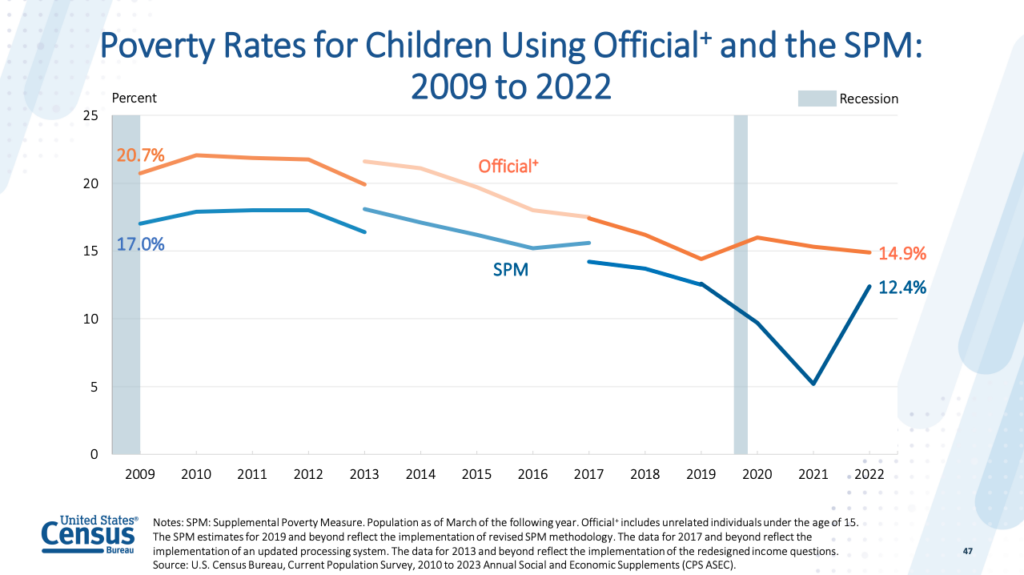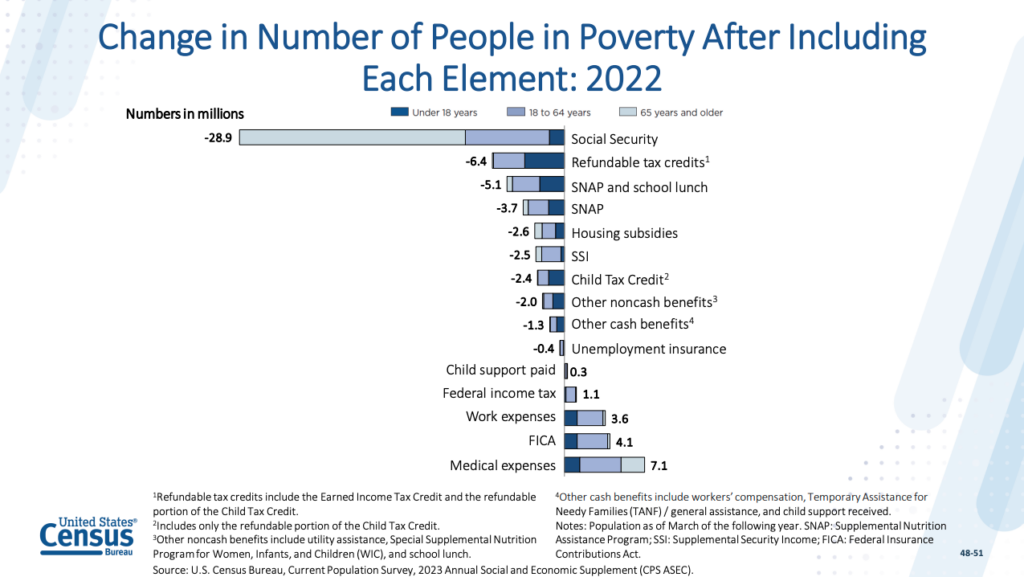Census Data Underscores That Poverty Is A Policy Choice
Share this page:
Historic increase in child poverty reinforces urgent need for continued state and federal actions for equitable revenues and investments
Today, the Census Bureau released 2022 data for poverty, income, and health insurance in 2022 from its Current Population Survey (CPS). While we await California-specific information, the national data makes it clear that when using the Supplemental Poverty Measure (SPM), which reflects the cost of living and the poverty-fighting power of public programs, that poverty rose by historic levels:
- Child poverty more than doubled from 5.2% to 12.4% from 2021-2022, the largest one-year increase ever.
- Black and Latinx children continued to face stark racial inequities, with poverty rates of 17.8% and 19.5% respectively, compared to 7.2% for non-Hispanic white children.
- Overall poverty was 12.4%, 4.6 percentage points higher than 2021, also the highest one-year increase ever
- Non-citizens experienced disproportionately high poverty, more than twice the U.S.-born population (24.4% vs. 11.2%)

While shocking in scope, these numbers are unfortunately not a surprise, and reverse what had been historic lows in poverty as well as progress in closing long-standing racial inequities, just one year earlier. There is no question that the rise in poverty is a result of policy decisions to reverse course on what had been highly effective investments in pandemic-era programs, especially:
- The expiration of the enhanced Child Tax Credit which kept only 3.2 million people out of poverty in 2022, half of the 6.4 million in 2021.
- The end of CalFresh emergency allotments and Pandemic EBT that represented one-third of the federal anti-hunger safety net.
This is even more sobering in light of a substantial increase in people working full-time year-round in 2022 – including the largest ever share of women working full-time year-round. The rise in poverty despite the strong labor market reinforces that too many jobs do not pay enough for families to meet their basic needs.
Census data highlights the power and effectiveness of public sector investments
Despite the dramatic worsening of poverty, the data also affirms the vital role of the government to lift children and families out of poverty when it takes aggressive actions to bolster public programs. Key federal programs that delivered major poverty reductions include the Child Tax Credit and other refundable credits, CalFresh (SNAP nationally), and school meals.

Poverty data is an urgent call for continued state and federal actions of public sector investments
The data highlights the pressing need for ongoing government action to fight poverty and advance a future of inclusive prosperity we know is possible. Black and Brown families are disproportionately impacted by the expiration of the successful interventions, and racial inequities will only be exacerbated unless governments take bold action to combat poverty. It is unequivocal that public sector investments effectively lift children and families out of poverty, while demonstrating high returns on investment.
We call on national and state policymakers to take continued action to fight poverty, including:
- Restore the enhanced Child Tax Credit with ITIN filers included as the American Family Act would do.
- Establish baby bonds to address the intergenerational wealth gap as the American Opportunity Accounts Act would do.
- Strengthen SNAP in the Farm Bill by ending the 3-month time limit in the Improving Access to Nutrition Act (Rep. Lee) and ensuring equitable college student access in the Enhanced Access to SNAP Act (Rep. Gomez).
- Achieve nationwide child nutrition access as the Universal School Meals Act and Stop Child Hunger Act (Rep. Levin) would do.
California must also continue to lead, and we call on the Governor and Legislature to build on their record of significant action to fight poverty to enact the bold policies needed to imagine a poverty-free, abundant future.
Simply put, we know what works. As President Biden said, the rise in poverty is no accident, but a deliberate policy choice. We call on our state and federal policymakers to take the actions needed for more equitable revenues and investments needed to end child poverty once and for all.